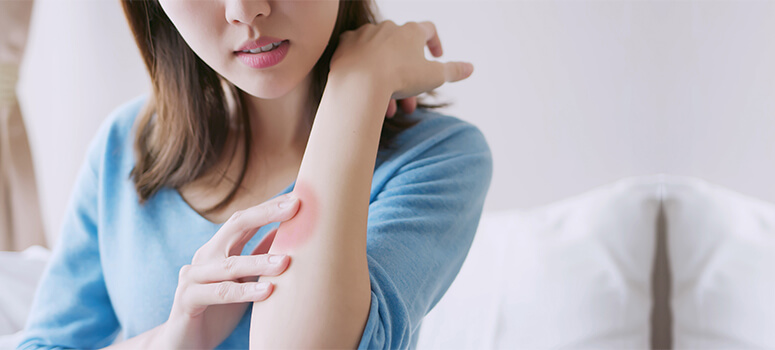Winters are harsh for your skin, and flare-ups are typical during cold weather. Eczema is one such common winter flare-up. Also known as atopic dermatitis, eczema is characterised by red, itchy, and inflamed skin that can be uncomfortable to deal with.
Eczema affects people of all age groups, with prevalence mostly in children. People with asthma and allergies are at a higher risk of this eczema. The condition is long-lasting and chronic, but no cure has been found to date.
However, with treatments and self-care, you can relieve the symptoms and prevent new outbreaks to a large extent. Read on to find out more on how to treat eczema along with its symptoms, causes, and preventive measures.
What are the Symptoms of Eczema?
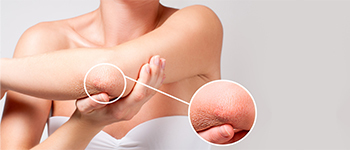
- Dry Skin
- Itching
- Red rashes, especially on the creases of elbows or knees, hands, feet, ankle, wrists, neck, face and scalp
- Bumps on the skin or crusting skin
- Scaly patches on the skin
- Swelling
Itching and scratching the affected area can further irritate the skin and exacerbate the symptoms.
When to Seek Medical Advice?
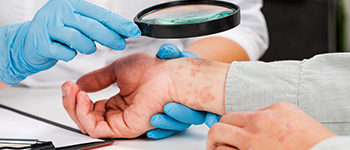
- Severe discomfort affecting sleep and daily activities
- Red streaks, pus, or yellow scabs
- If the condition is persistent despite trying home remedies
How is Eczema Caused?
Before we talk about the preventive measures, we need to identify eczema triggers first. Eczema occurs when your skin’s ability to protect you from bacteria and allergens is affected.
Major eczema causes include:
• Genes
Your chance of getting eczema is higher if dermatitis is a common condition in your family. Moreover, a history of asthma, hay fever, and allergens also poses a risk for you.
• Irritants and Allergens
Allergens like pollen, pet hair, dust mites, and molds are common eczema triggers. Similarly, certain soaps, shampoos, body care products, or detergents can irritate your skin, triggering eczema. People can also develop an allergic reaction to certain foods.
• Extreme Temperature
Extremely hot or cold weather or sudden change in the skin temperature can flare up eczema. Similarly, high or low humidity and excess sweat can also bring about eczema episodes.
• Stress and Hormones
Hormonal changes in women, such as during the menstrual cycle or pregnancy, can also lead to increased signs of eczema. Though stress is not directly related to eczema, high-stress levels worsen the symptoms.
What Are Some Other Types of Eczema?
Besides atopic dermatitis, your skin can also develop other eczema types. These include:
• Allergic Contact Dermatitis
Such allergies occur if your skin comes in contact with a foreign substance that your immune system fails to recognise.
• Dyshidrotic Eczema
This eczema is characterised by blisters and irritation on the skin of the palms and soles of the feet.
• Neurodermatitis
Neurodermatitis causes scaly patches on the skin of forearms, wrists, legs and scalp. A cause as simple as itching from an insect bite can lead to the condition.
• Discoid Eczema
This condition results in circular, itchy patches of irritated skin accompanied by scales and crusts.
• Stasis Dermatitis
Stasis Dermatitis leads to skin irritation on the lower legs. This is caused due to circulatory problems.
How Can I Prevent Eczema?
Eczema cannot be fully cured. However, you can take steps to eliminate its symptoms and prevent future outbreaks.
• Avoid Rapid Temperature Change

• Moisturise Often
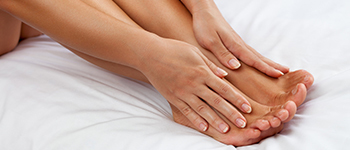
• Stay Away from Eczema Triggers

• Avoid Hot Showers

• Natural Remedies
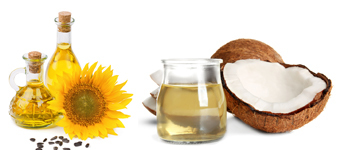
- Virgin sunflower seed oil
- Virgin coconut oil
- Acupuncture or Acupressure
- Probiotics
- Bleach bath or rice starch bath
Besides, studies have found Vitamin D supplements to significantly reduce the symptoms of eczema.
Dr. Surajit Gorai Talks About The Causes And Prevention Of Eczema
In Conclusion
Eczema is common but can also get very uncomfortable. It can affect your life at many levels and hamper your confidence in public. Hence, it’s best to visit a dermatologist as soon as you notice signs of eczema. Skin and Hair Academy can put you in touch with leading dermatologists near you immediately.
Your dermatologist can advise you on how to treat eczema based on your age, symptoms and health condition. The medications provided by your doctor, along with the above preventive measures, can help you keep your eczema symptoms under control.

